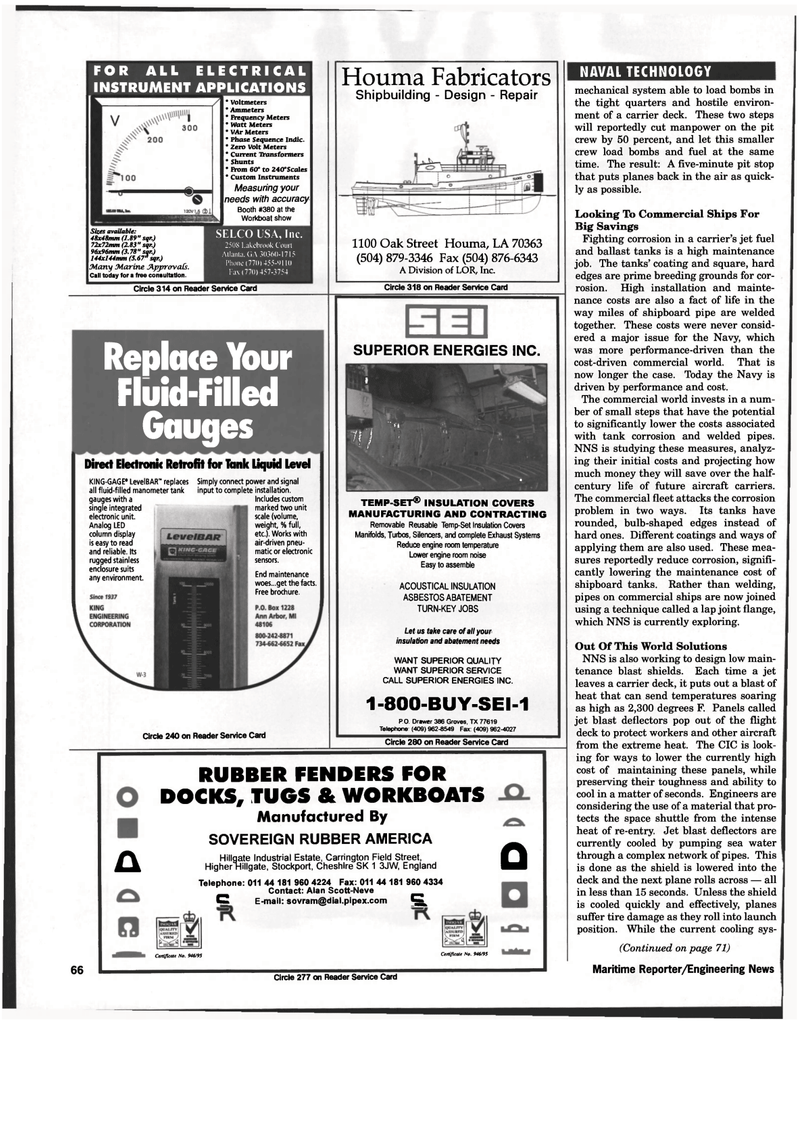
Page 70: of Maritime Reporter Magazine (February 1998)
Read this page in Pdf, Flash or Html5 edition of February 1998 Maritime Reporter Magazine
FOR ALL ELECTRICAL
INSTRUMENT APPLICATIONS
Sizes available: 48x48mm (1.89" sqr.) 72x72mm (2.83" sqr.) 96x96mm (3.78" sqr.) 144x144mm (5.67* sqr.)
Many Marine ApprcrvaCs.
Call today for a free consultation. * Voltmeters * Ammeters * Frequency Meters * Watt Meters * VAr Meters * Phase Sequence Indie. * Zero Volt Meters * Current Transformers * Shunts * Ftom 60° to 240°Scales * Custom Instruments
Measuring your needs with accuracy
Booth #380 at the
Workboat show
SELCO USA, Inc. 2508 Lakebrook Court
Atlanta, GA 30360-1715
Phone(770)455-9110
Fax (770)457-3754
Circle 314 on Reader Service Card
Replace Your
Fluid-Filled Gauges
Direct Electronic Retrofit for Tank Liquid Level
KING-GAGE* LevelBAR" replaces all fluid-filled manometer tank gauges with a single integrated electronic unit.
Analog LED column display is easy to read and reliable. Its rugged stainless enclosure suits any environment.
Simply connect power and signal input to complete installation.
Includes custom marked two unit scale (volume, weight, % full, etc.). Works with air-driven pneu- matic or electronic sensors.
End maintenance woes...get the facts.
Free brochure.
Circle 240 on Reader Service Card
Houma Fabricators
Shipbuilding - Design - Repair 1100 Oak Street Houma, LA 70363 (504) 879-3346 Fax (504) 876-6343
A Division of LOR, Inc.
Circle 318 on Reader Service Card
SUPERIOR ENERGIES INC. 1 1 i ";tf' flij " mmi / "Sw ""V ll
TEMP-SET® INSULATION COVERS
MANUFACTURING AND CONTRACTING
Removable Reusable Temp-Set Insulation Covers
Manifolds, Turbos, Silencers, and complete Exhaust Systems
Reduce engine room temperature
Lower engine room noise
Easy to assemble
ACOUSTICAL INSULATION
ASBESTOS ABATEMENT
TURN-KEY JOBS
Let us take care of all your insulation and abatement needs
WANT SUPERIOR QUALITY
WANT SUPERIOR SERVICE
CALL SUPERIOR ENERGIES INC. 1 -800-BU Y-SEI-1
P O Drawer 386 Groves, TX 77619
Telephone: (409) 962-8549 Fax: (409) 962-4027
Circle 280 on Reader Service Card 66
A
RUBBER FENDERS FOR
DOCKS, TUGS & WORKBOATS
Manufactured By
SOVEREIGN RUBBER AMERICA
Hillgate Industrial Estate, Carrington Field Street,
HigherTHillgate, Stockport, Cheshire SK 1 3JW, England
Telephone: 011 44 181 960 4224 Fax: 011 44 181 960 4334
Contact: Alan Scott-Neve
C E-mail: [email protected] ^^ o
Certificate No. 946/95 Certificate No. 946/95
Circle 277 on Reader Service Card
NAVAL TECHNOLOGY mechanical system able to load bombs in the tight quarters and hostile environ- ment of a carrier deck. These two steps will reportedly cut manpower on the pit crew by 50 percent, and let this smaller crew load bombs and fuel at the same time. The result: A five-minute pit stop that puts planes back in the air as quick- ly as possible.
Looking To Commercial Ships For
Big Savings
Fighting corrosion in a carrier's jet fuel and ballast tanks is a high maintenance job. The tanks' coating and square, hard edges are prime breeding grounds for cor- rosion. High installation and mainte- nance costs are also a fact of life in the way miles of shipboard pipe are welded together. These costs were never consid- ered a major issue for the Navy, which was more performance-driven than the cost-driven commercial world. That is now longer the case. Today the Navy is driven by performance and cost.
The commercial world invests in a num- ber of small steps that have the potential to significantly lower the costs associated with tank corrosion and welded pipes.
NNS is studying these measures, analyz- ing their initial costs and projecting how much money they will save over the half- century life of future aircraft carriers.
The commercial fleet attacks the corrosion problem in two ways. Its tanks have rounded, bulb-shaped edges instead of hard ones. Different coatings and ways of applying them are also used. These mea- sures reportedly reduce corrosion, signifi- cantly lowering the maintenance cost of shipboard tanks. Rather than welding, pipes on commercial ships are now joined using a technique called a lap joint flange, which NNS is currently exploring.
Out Of This World Solutions
NNS is also working to design low main- tenance blast shields. Each time a jet leaves a carrier deck, it puts out a blast of heat that can send temperatures soaring as high as 2,300 degrees F. Panels called jet blast deflectors pop out of the flight deck to protect workers and other aircraft from the extreme heat. The CIC is look- ing for ways to lower the currently high cost of maintaining these panels, while preserving their toughness and ability to cool in a matter of seconds. Engineers are considering the use of a material that pro- tects the space shuttle from the intense heat of re-entry. Jet blast deflectors are currently cooled by pumping sea water through a complex network of pipes. This is done as the shield is lowered into the deck and the next plane rolls across — all in less than 15 seconds. Unless the shield is cooled quickly and effectively, planes suffer tire damage as they roll into launch position. While the current cooling sys- (Continued on page 71)
Maritime Reporter/Engineering News

 69
69

 71
71
